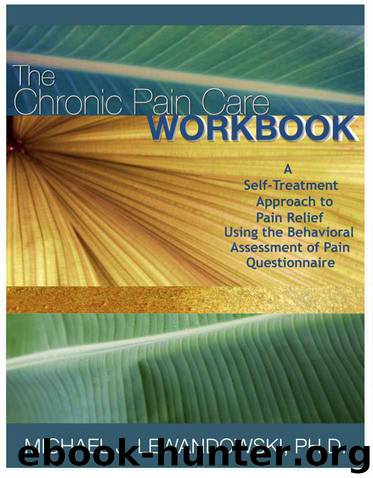The Chronic Pain Care Workbook by Michael Lewandowski

Author:Michael Lewandowski [Lewandowski, Michael]
Language: eng
Format: epub
Publisher: Lucky Bat Books
Published: 2013-02-03T23:00:00+00:00
Interpreting Your Score
Level three: 3.7 or more. If you score at this level, you tend to magnify the threat of your pain. You may feel you are incapable of dealing with pain, that the pain is awful and terrible, and that pain controls your life.
Level two: 2.0 to 3.6. You are similar to most people who suffer from chronic pain. You may believe that your pain is in the driver's seat while you ride in the back—or worse, the trunk—with little or no control. You may think things like I will be stuck in this pain forever or having pain means I have nothing to look forward to.
Level one: 1.9 or less. Congratulations. Your score is less than the majority of chronic pain patients. You are likely handling your pain fairly well and are not catastrophizing about your pain and letting it control your life. You are probably not jumping to conclusions or assuming the worst when you experience your pain.
If you find yourself in level two or three, you need to begin working on your core ideas about living with chronic pain.
The Effects of Catastrophizing
Catastrophizing is more than a head game you play with yourself. It has a profound effect on your emotions, your relationships, and your experience of physical distress.
Catastrophizing and Chronic Pain
The cycle of catastrophic ideas about pain causes a cycle of behaviors that can maintain and intensify chronic pain. If you are always expecting to be in pain, always looking for the pain, you will notice your pain more, and thus it will be worse.
One reason people catastrophize about their pain is that they misinterpret bodily sensations as evidence that something is seriously wrong physically. An ambiguous situation arises (for example, you feel a painful sensation and you don't know the cause) and you experience the situation as a catastrophic event that is directly related to your physical problems. Anxiety and worry follow, and you begin to feel out of control of your life.
Repeatedly engaging in catastrophic thinking can lead you to develop enduring beliefs that painful stimuli are always significant and threatening and that you are unable to effectively manage the stress associated with painful experiences. Whether or not these thoughts are based on truth, they change how you live.
Catastrophizing and Relationships
If you find yourself catastrophizing about your pain and also rate your pain in the upper third of the pain intensity scale, you are more likely to experience significant limitations on your social life. My own research backs this up. People with this combination see friends and relatives less often, go out less, and travel less. The fear of pain begins to rule their lives. But it's not just a matter of fear. Women who rate their pain in the upper third of the pain scale and who catastrophize about their pain also have less energy.
Catastrophizing hits those in pain mentally, physically, and socially—a trifecta of perpetual disability.
People who engage in a lot of catastrophic thinking often have a high need for emotional support from others.
Download
This site does not store any files on its server. We only index and link to content provided by other sites. Please contact the content providers to delete copyright contents if any and email us, we'll remove relevant links or contents immediately.
Men In Love by Nancy Friday(5229)
Everything Happens for a Reason by Kate Bowler(4729)
The Immortal Life of Henrietta Lacks by Rebecca Skloot(4571)
Why We Sleep by Matthew Walker(4429)
The Sports Rules Book by Human Kinetics(4377)
Not a Diet Book by James Smith(3408)
The Emperor of All Maladies: A Biography of Cancer by Siddhartha Mukherjee(3140)
Sapiens and Homo Deus by Yuval Noah Harari(3058)
Day by Elie Wiesel(2778)
Angels in America by Tony Kushner(2641)
A Burst of Light by Audre Lorde(2588)
Endless Forms Most Beautiful by Sean B. Carroll(2470)
Hashimoto's Protocol by Izabella Wentz PharmD(2368)
Dirty Genes by Ben Lynch(2311)
Reservoir 13 by Jon McGregor(2295)
Wonder by R J Palacio(2201)
And the Band Played On by Randy Shilts(2185)
The Immune System Recovery Plan by Susan Blum(2053)
Stretching to Stay Young by Jessica Matthews(2023)
